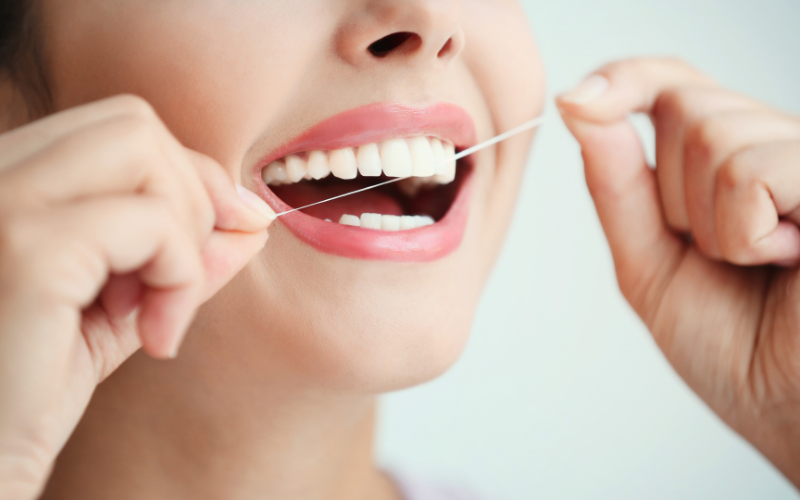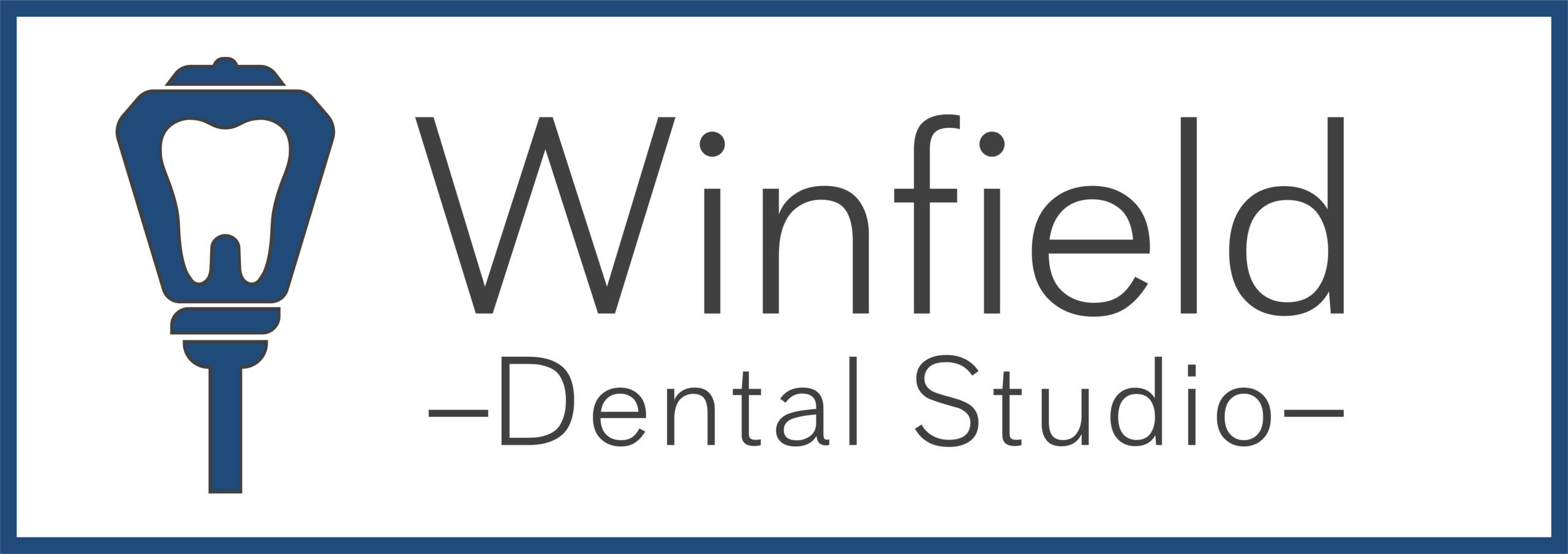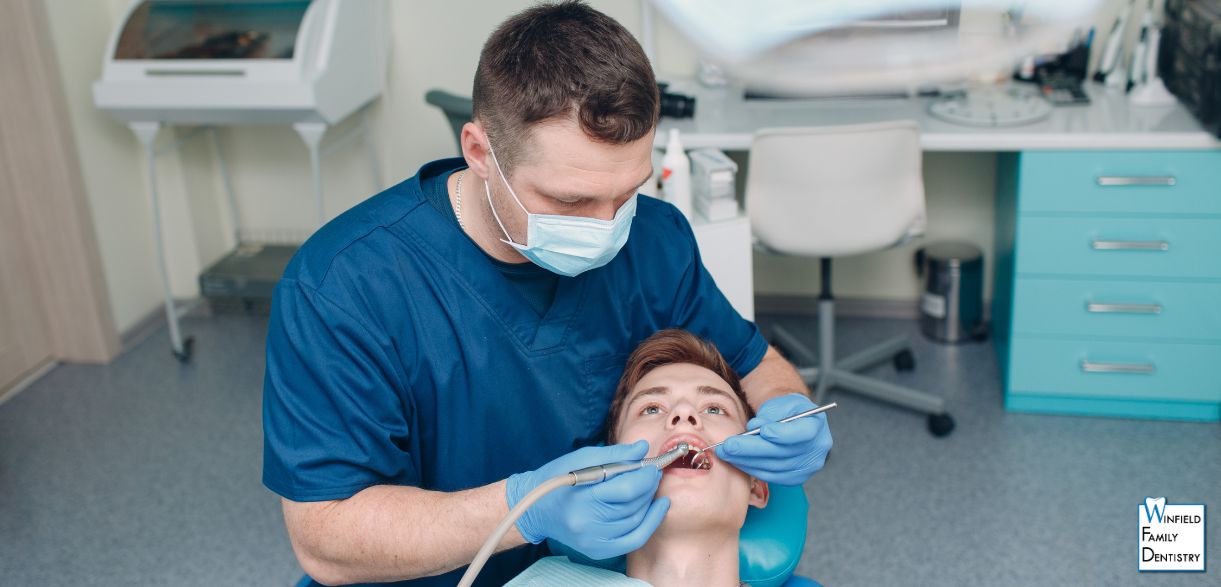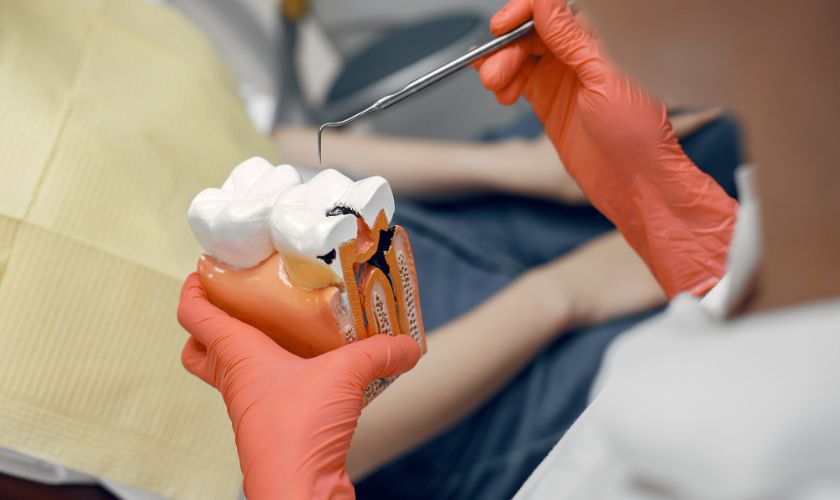
Keeping your optimal oral health maintained goes beyond just brushing and flossing. Regular dental cleanings and exams are essential preventive measures to ensure that common dental issues, like cavities, gum disease, and plaque buildup, are kept at bay.
Understanding the role these appointments play in preserving your dental health is key to recognizing their importance in your routine. In this blog, we’ll explore how cleanings and exams prevent common dental issues while emphasizing the value of consistent dental care.
The Basics of Dental Cleanings and Exams
Before diving into how cleanings and exams prevent dental issues, let’s first understand what these appointments typically involve.
What Happens During a Dental Cleaning?
- Plaque and Tartar Removal: A dental hygienist will remove plaque and tartar (hardened plaque) from the surface of your teeth and around the gumline using specialized tools.
- Deep Cleaning: In some cases, if there’s significant plaque buildup, deep cleaning may be required to thoroughly clean areas below the gumline.
- Polishing: After plaque and tartar are removed, the teeth are polished to remove surface stains, leaving your teeth smoother and less likely to accumulate plaque.
- Fluoride Treatment: Fluoride may be applied to help strengthen tooth enamel and prevent cavities.
What Happens During a Dental Exam?
- Visual Inspection: The dentist will inspect your teeth, gums, and mouth for signs of decay, gum disease, or abnormalities.
- X-rays: Dental X-rays may be taken to check for underlying problems not visible to the naked eye, such as bone loss or cavities between teeth.
- Oral Cancer Screening: A thorough oral cancer screening is often part of the exam to detect early signs of oral cancer.
- Discussion: The dentist will discuss their findings, make recommendations, and address any concerns you may have about your oral health.
How Dental Cleanings Prevent Common Dental Issues?
Routine cleanings play a vital role in maintaining dental health. Here’s how they prevent the most common problems:
1. Preventing Plaque and Tartar Buildup
Plaque is a sticky film of bacteria that forms on your teeth. Over time, if it’s not removed, it hardens into tartar, which can only be removed by a dental professional. Tartar and plaque buildup are the leading causes of:
- Cavities: The bacteria in plaque produce acids that erode tooth enamel, leading to cavities.
- Gum Disease: Plaque accumulation along the gumline can cause gingivitis (early-stage gum disease) and, if untreated, progress to periodontitis (advanced gum disease).
- Bad Breath: Tartar buildup can harbor bacteria that cause chronic bad breath, also known as halitosis.
By getting your teeth cleaned every six months, you prevent the buildup of plaque and tartar, thereby minimizing the risk of these dental issues.
2. Reducing The Risk of Tooth Decay
Tooth decay occurs when bacteria in your mouth feed on sugars and produce acids that erode enamel. During a cleaning:
- Professional Cleaning: Hygienists use specialized tools to remove plaque that cannot be reached through regular brushing and flossing.
- Strengthening Enamel: Fluoride treatments applied during cleanings help to remineralize enamel, making it more resistant to decay.
- Early Detection: Cleanings allow for early identification of decay, so treatment can begin before the problem worsens.
3. Preventing Gum Disease
Gum disease is one of the most common oral health problems. Regular cleanings help to prevent and manage gum disease by:
- Reducing Inflammation: Removing plaque and tartar helps reduce gum inflammation, preventing gingivitis.
- Preventing Bone Loss: Advanced gum disease (periodontitis) can lead to bone loss and tooth loss. Cleanings help stop the progression by targeting tartar buildup under the gumline.
- Maintaining Healthy Gums: Professional cleanings help keep your gums healthy, preventing receding gums and ensuring that the tissue supporting your teeth remains strong.
How Dental Exams Help Prevent Common Dental Issues?
Regular dental exams are as crucial as cleanings because they allow your dentist to monitor your oral health and detect any problems early. Here’s how exams prevent common issues:
1. Detecting Cavities Early
During an exam, your dentist will check for any signs of tooth decay. Often, cavities start small and may not cause pain right away. However, your dentist can identify these early-stage cavities and recommend treatment (such as fillings) before the decay spreads deeper into the tooth.
2. Identifying Gum Disease
A dental exam can reveal early signs of gum disease, such as gum inflammation, bleeding, or receding gums. Early detection and treatment prevent the condition from progressing, avoiding more severe consequences like tooth loss.
3. Spotting Oral Cancer
Oral cancer screening is a crucial part of a dental exam. Dentists are trained to spot signs of oral cancer, such as unusual sores or lesions in the mouth. Early detection is key to successful treatment and can save lives.
4. Monitoring Overall Oral Health
Exams allow your dentist to monitor changes in your oral health over time. By regularly examining your teeth, gums, and mouth, they can:
- Track tooth wear: Teeth grinding (bruxism) can cause tooth wear and fractures. Dentists can spot these signs and recommend solutions such as nightguards.
- Check for alignment issues: Exams help monitor the alignment of your teeth and jaws, addressing problems before they lead to more serious complications like TMJ disorders.
The Importance of Routine Cleanings and Exams
Many dental issues, such as tooth decay and gum disease, can develop without noticeable symptoms in the early stages. By the time pain or discomfort sets in, the problem may already require more extensive treatment. Routine cleanings and exams are a proactive approach that helps to:
- Catch problems early: Early detection allows for less invasive, more affordable treatments.
- Save money in the long run: Preventive care reduces the need for expensive procedures such as root canals, crowns, or dental implants.
- Maintain overall health: Oral health is linked to overall health. Gum disease, in particular, has been associated with conditions like heart disease and diabetes, making regular dental visits vital for more than just your teeth.
Regular dental cleanings and exams are more than just routine check-ups; they are essential preventive measures that can save you from developing serious dental problems. Cleanings remove harmful plaque and tartar, while exams detect early signs of decay, gum disease, and even oral cancer.
By scheduling these appointments every six months, you’re taking a crucial step toward protecting your oral health and preventing common dental issues from turning into costly, painful problems. Don’t wait for symptoms to arise—book your next cleaning and exam today to keep your smile healthy!





